Asking for money sucks. Maybe you fear rejection or maybe you worry that you’ll look desperate, greedy, incompetent or rude.
It’s a lot like being a middle schooler trying to hold hands or put an arm around your date while at the movies.
Asking for money often raises internal doubts like:
* Will I seem greedy?
* Will it negatively affect our relationship?
* Do they trust me?
* Will they understand why or buy into my vision?
* Will I look like an a—hole?
These are legitimate questions and they can arise in a variety of circumstances in life.But when you are going to run a music crowdfunding project, you cannot afford to have these questions dogging you because self doubt and fear will betray your efforts in some subtle and many not-so-subtle ways.
Thus, it is CRUCIAL that you are WELL PREPARED to ask for money for your crowdfunding project. If you’re not, you run the potential risk of sabotaging your own efforts which (newsflash!) isn’t really a great thing to do.There are tons of resources to help you prepare to ask for something you want – just google “how to get what you want.” It shouldn’t take you more than a page or two of results to get a good grasp.
How to get what you want crib sheet
* Be grounded, centered and certain in WHY you are asking (Purpose and Mission)
* Be kind and make sure that saying yes may also be in the other person’s best interest
* Practice asking so that you are confident and know what you’ll say
* Directly and clearly ask for what you want
* Say Thank You
Once you’ve done all your homework, you will be significantly more prepared. But as you actually execute your music crowdfunding project, there remain many more potential pitfalls when you are asking.
I’m going to give you the top 25 ways musicians screw up when asking for money during their music crowdfunding campaign.
Make these mistakes and you could end up looking like a money hungry fool.
Going through the list should help you solidify the language you use in your project and when asking individuals.
Do this homework ahead of time because these mistakes will actually bleed over into your video, project description and project updates if you aren’t careful.
THE BIGGEST MUSIC CROWDFUNDING MISTAKE, OBVIOUSLY
1) NOT ASKING
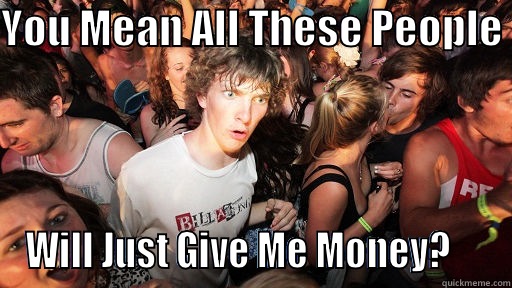
I honestly can’t imagine needing to write much about this.
YOU HAVE TO ASK!
Whether you are quoting Sarah Peck from her article, Nora Roberts, Tony Robbins or anybody else with a pulse, they’ll say: If you don’t ask, the answer is always no.
Obviously, you need to ask. But also beware the stealthy cousins of Not Asking such as:
2) The Non-ask Ask
The non-ask Ask is usually due to fear or perhaps forgetfulness.
It is where you talk about your project, your purpose and your mission with your music crowdfunding campaign. You talk about what the funds will be used for and how the result will affect your life. You talk about how great it is to have supportive people in your life…
And then you stop short, not asking the person or audience to become a backer.
YOU HAVE TO ASK!
Don’t forget this!!
Another infamous cousin of not asking is:
3) Thinking You Shouldn’t Have To Ask
This is functionally equivalent to the Non-ask Ask but is rooted in ego and pride instead of fear or uncertainty.
It is particularly likely to happen with people you are close to and care the most about because you feel like they should know what’s going on with you and that they should give their support automatically because of how close you are with them.
But the truth is that even these people will need to be asked directly.
While some people may volunteer support for your project, others who really care about you may be too busy or may not realize the importance of your campaign.
Or maybe they’re just not thinking clearly and they become a victim of the Bystander Effect where they assume everybody else will do it so they don’t have to.
Don’t hope for mind readers.
Ask.
HOW YOU ASK
These mistakes are big ones because they can severely decrease the chance of a person saying yes to your request.
They usually happen because you don’t completely understand your purpose and passion OR because you try to copy all of the other disingenuous marketing drivel out there which you are used to seeing in the media and from other musicians who don’t know what they are doing.
Overcoming these mistakes is as simple as preparing yourself. You must truly know what you and your project are all about and what you are specifically asking for.
It also requires that you care enough about the other person to only want their “YES” if it is also right for them.
4) Being Phony or Employing Bullshit Hype
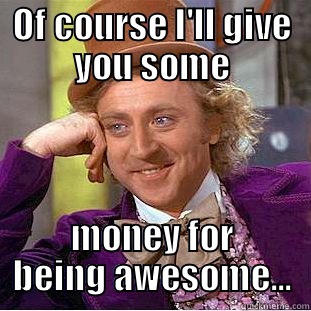
This Forbes business blog post, Get What You Want By Asking, looks at the genetic makeup of a good Ask: Connection, Vulnerability, Timing and Honesty.
Dave Kerpen supports the notion of being Authentic, Transparent and Vulnerable.
Once you start reading about Asking, you’ll see this all over the place because it works.
You cannot bullshit your way to crowdfunding success. To demonstrate that point, see this Kickstarter and thisKickstarter.
No bullshit hype… Heart hype is essential. ~ Danielle LaPorte
You must understand your purpose and passion and communicate on a trusting, person-to-person level. It’s the same way you’d talk to your best friend.
Don’t try to be all I’m-a-superstar-you-are-an-adoring-fan (unless you are actually a superstar I suppose).
It doesn’t work in music crowdfunding because music and music crowdfunding are both much more personal than your typical internet-based product or marketplace.
5) Being Uncertain of Your Desire
Are you doing this because it seems like it might help you “get somewhere?”
Or are you doing this because you have a fire burning behind your artistic vision that you must see through?
Back to Sarah Peck, she is right…
You need to know you want it!
Want as in “you need it with your very soul…”
Not simply “it would be nice…”
Want as in “you would do whatever it takes to help your mom cover that life-saving medical treatment…”
Not “oh look at that sweet pair of shoes, I want those…”
I have seen many failed music Kickstarters where it’s closer to the later.
6) Not Having Dealt With Your Fear of Asking
Fear is a very powerful psychological factor in our actions and choices… So much so that you can go pay $49 for an online course to Overcome Fear!
If you haven’t dealt with your fear of asking in general, then you may end up betraying your own efforts.
It’s not that you have to be completely fearless. You may always have a little bit of discomfort when asking people to back your music crowdfunding project.
You simply need to have a holistic understanding of your mission and purpose so that you understand and can justify your need to ask people for money.
Because if you are fearful, chances are good that either you don’t really think you need it or you don’t really believe in what you are doing.
If you feel like you’ve got your Purpose covered and you know you want it and you’re still having trouble, head on over here for some music Kickstarter advice on how to slam the door on your fear of asking for money!
You can also read How To Ask for What You Want which points out that “Asking for help makes the relationship stronger.”
7) Lacking Genuine Concern for the Person You are Asking
Music Crowdfunding = asking for help.
Period.
There is nothing wrong with that. It’s actually good because the people that do help are interested in the outcome of the project; they benefit from it.
But before you run off asking for help, spend a little time focussing on the ideas of gratitude towards and caring for those whom you’ll approach.
Why?
Because people are more likely to GIVE help when they know they’re likely to GET help.
Check out the 11:40 mark of this Simon Sinek video.
He describes how the Marines build the relationships and social fabric necessary when sending soldiers into battle who must be willing to kill or to be killed for their fellow soldiers. Pretty intense stuff.
He points out that those who think they can do it on their own or who aren’t team players slowly get ostracized during training and that they aren’t able to accomplish their individual goals until they help the team accomplish its goal.
Now obviously, music crowdfunding isn’t life and death.
But there are subtle ways to screw this up like when you put out the vibe that you’ll achieve your goal because of how awesome you are, how awesome the music is, how awesome the players are or how much you’ve achieved in the past.
On the flip side, don’t pander. This isn’t a contest to see who can gush on and on about how supportive your fans are and how you couldn’t do it without them and how everybody is awesome and how much you love them and blah blah blah. (Even though it’s true.)
The way to show that you care is to be certain that pledging to your campaign is right for the person you are talking to.
Don’t EXPECT them to back you. Don’t COERCE or FORCE them into backing you. Don’t GUILT them into backing you.
Show them the opportunity in front of them and let them make their decision.
8) Expecting People to Jump on Your Music Crowdfunding Bandwagon
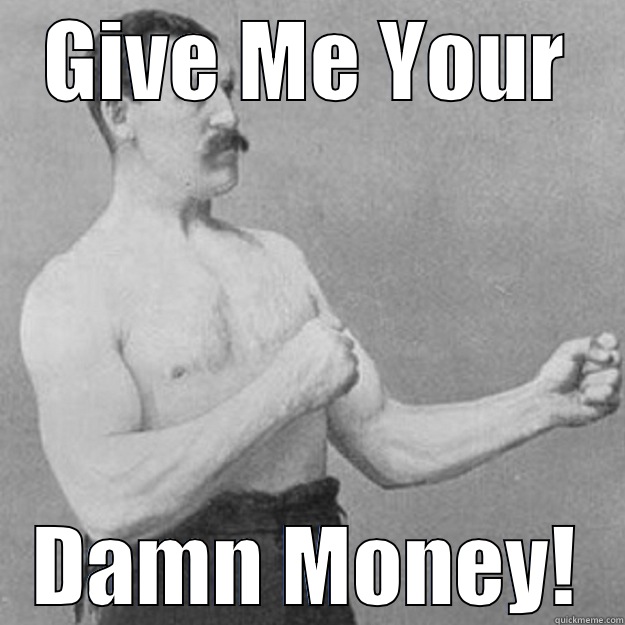
One of the most annoying lines ever in a music crowdfunding video is, “And that’s where YOU come in…”
Bullshit.
People don’t come into the equation just because you need money.
They come into the equation because you are developing your artistry, your vision, and your project in a way that will benefit them.
You should be thinking about people from the very beginning because without them, your music is the same as silence. (If nobody is around to hear it, does a singer make a sound when their mouth opens?)
This isn’t anything new to you but just be mindful of what you say and how you say it as it is counterproductive to simply assume people into backing you.
9) Asking Clumsily
This results from simple laziness and is not justifiable given all of the other work you will be putting into your music crowdfunding project.
Read #5 of 9 Surefire Ways to Get What You Want: “Practice until you’re an expert, and keep practicing.”
The first several times you present your story and ask for help are going to be awkward. There is no way around it so don’t worry about it.
You will need practice to find a smooth and flowing narrative that succinctly accounts for all of the necessary considerations. This is why professional sales people go through extensive training and often times work from a script ~ so they don’t miss things or screw it up!
Find a trusted friend who is willing to invest some time and practice going through what you’re going to say.
I would recommend practicing at least five times. (Five is arbitrary but you should be getting the hang of it by then.)
When you think you’re good and comfortable, ask your friend to start pushing you out of your comfort zone with non-receptive body language or snarky comments.
This will give you a big leg up when you start talking to people during your project.
10) Playing the Victim Card
You aren’t likely to start your campaign in victim mode where you feel sorry for yourself because raising money is sooooo difficult.
But if things become difficult, it can be tempting to place the blame on things outside of your control including other people.
This might make you feel better but it sure as heck isn’t going to actually make things better.
And if you start leading with negative feelings about how things are going, you are not likely at all to get backers.
People will be backing you because of purpose, mission and vision.
If you act like the victim, it ends up sounding like whining and an uninspired cash grab.
11) Focusing More On Your Need Than On Your Mission
This is another area which can subtly shift people’s perception of your project to cold grab for cash.
Obviously, you have a need that you are addressing with your music crowdfunding project.
But you can’t afford to focus on it because people don’t give due to needs.
The non-profit world knows this all-too-well. Many, many organizations make the mistake of thinking that because their motives are worthy, people will respond to their need.
Experience has shown this to be untrue again and again.
A catch phrase at many successful organizations: Money follows Mission.
It’s a fact that you need to internalize before you start talking to people.
Don’t get me wrong, you can still talk about what you’ll spend the money on. You just can’t present your costs as a primary motivator because it won’t motivate anyone!
12) Boring People With Your Laundry List of Credentials

This is the sneaky step-brother of Bullshit Hype but instead of exaggerating or using an innocent little white lie, everything you say is actually true…
It’s just that it’s either boring to hear or the listener doesn’t really think it’s important to their decision.
As musicians, you are trained to do this from early on in your profession. Go pick up the local What’s Happening This Weekend and read through the press releases for local bands or their CD releases:
“We’ve opened for…”
“Produced by the legendary Bob McSchmee who has also produced The Awesomest Band Ever…”
“Featuring the lead guitar player from the hugely successful group The Guitars So Hot They’re On Fire…”
But honestly, most people start tuning out before too long if you lead with this, especially when it comes to music crowdfunding.
Instead, they want to hear about mission, purpose and what the project means to your life because that’s what drives 90% of music crowdfunding contributions. Hell, maybe it’s even 100%.
When a person starts showing interest and asking you more about the project, feel free to gush. But don’t make the mistake of leading or even trying to convince with your laundry list.
WHO YOU ASK
This is probably the most common mistake that we see in campaigns and generally results from a misunderstanding of music crowdfunding mechanics.
Remember, 75% of music crowdfunding projects are for under $10,000 and they typically have 100-200 backers.
Where are these backers most likely to come from: your pool of existing relationships (friends, family, fans) or strangers who have never encountered you?
It’s not that you can’t turn strangers into fans… you can. But during a crowdfunding campaign, this is a little bit like a sales person cold calling prospects out of the yellow pages ~ EXTREMELY DIFFICULT with a low conversion rate.
Your strategy with the highest probability of success focuses on existing relationships.
And without going into detail, the bottom line for dealing with these folks comes straight from Simon Sinek:
People don’t buy what you do, they buy Why you do it.
The best way to communicate your Why, which is your purpose and mission, is to think about talking to many individuals instead of one, big crowd.
13) Ignoring Individuals and Focussing On “The Crowd”
Big mistake, killer even!
There is no better way to establish a connection with someone than by being completely personal.
So you cannot think of “the crowd” like it’s a gym full of people who you are going to give a speech to.
Instead, take a cue from the politicians. (I can’t believe I’m saying that!)
Talk to people on both an individual basis AND to all of them at once.
If you only talk to all of them at once, your chances of making a personal connection fall dramatically.
In The Psychology of Persuasion (one of the most widely read psychology books of all time, especially in the business world), Dr. Robert Cialdini talks about the Bystander Effect and how, the more people there are in a crowd, the less likely each individual is to act.
You’ve probably heard stories of experiments on this where researchers will set up a fake “mugging” in a busy place like Times Square just to see if anybody will help the victim. And, amazingly enough, nobody helps even though there are hundreds or even a thousand people around.
Cialdini has a simple solution to this: when he needs help, he approaches an individual directly.
For example, if he were in a crowd and fell down in cardiac arrest, he would make eye contact with a single individual, point to them and say “you, get a doctor please.” (You know, if he could talk during cardiac arrest.)
And guess what?
The chances of that person helping out go from nearly zero to nearly 100%.
The mechanics of music crowdfunding work the same way, maybe not from 0 to 100, but even a modest doubling of the probability of receiving help makes a huge, measurable difference.
So, do the work of talking to one person at a time.
Yes, you should still deploy communication to your email list and through social media. But this is your secondary task and should still focus on the same things you talk to people about individually.
Your first objective is to reach out to individuals. It is literally the difference between a successful campaign and a failed one.
14) Trying to “Go Viral”
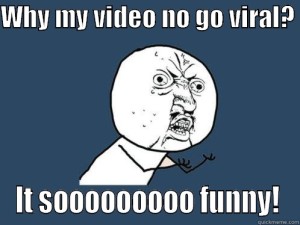
The holy grail of any marketing effort is to “go viral.”
You end up getting untold amounts of exposure for free which usually results in lots and lots of new, paying customers.
So, why wouldn’t you try to “go viral?”
Simple: the probability of success is soooooo low that it’s a waste of your most precious resource: time.
Crowdfunding typically lasts for around a month. This is a limited amount of time to contact all of the individuals whom you need to (remember the last point?).
You cannot afford to be wasting time screwing around trying to “go viral.” This results in lots of unfocused, non-productive effort… oh, and two more things.
One, have you ever actually seen a music crowdfunding project go viral? I have not. Even the biggest ones like Amanda Palmer were primarily funded through relationships which were already in place when the campaign started.
Two, remember all that stuff up above about “how you ask?” When you try to “go viral,” you will inevitably confuse the issue and water down your purpose and mission.
P.S. If you want to shoot for going viral after your campaign is over, have at it. Just don’t try it during your campaign. Given the low likelihood of success, the trade off just isn’t worth it.
WHAT YOU ASK FOR
Asking for the wrong thing will also adversely affect your efforts. Luckily, simply knowing what you will ask for ahead of time will take care of the possibility that you get off track and go wrong.
15) Confusing the Issue
If you Googled “how to get what you want” earlier and read a few results, then surely you have seen the advice to be clear and specific in what you ask for. And you need to communicate this clear, specific need in a straight forward manner.
This article, 9 Ways to Ask for (and Get) What You Want, takes it a step further by pointing out that piling on extra reasons doesn’t really help:
2. Don’t pile on the reasons. Speaking of charity donations, research by Dartmouth psychologist Daniel Feiler and colleagues (2012) showed that alumni were more likely to give money to their alma mater when given a single basis for the request. The alumni asked to give for altruistic reasons (to help others) or egoistic reasons (to help them feel good),gave twice as much, on average, as alumni asked to donate for both altruistic and egoistic reasons. Find one reason to make your request, and give that the biggest play possible in order to ensure that you’ll get a positive response in return.
I often see music crowdfunding projects for a CD tack on a little charity donation, maybe 5 or 10%. Heck, Pledgemusic makes charitable giving part of their platform.
But I don’t think it helps.
If you do a great job of communicating your purpose and mission, then a charitable donation might not hurt. But if you try to use your charitable intentions, honorable as they may be, as a reason to support your project, then your efforts are misplaced.
Start with your Why… and if you ask me, finish with your Why with a ton of Why in the middle.
16) Asking For Too Much

This is a mistake that can happen particularly on an individual level.
Yes, you need to be specific and clear about your need. But as we discussed earlier, you need to also have concern for the person you are talking to.
If that person is broke for whatever reason, then asking them for a $100 donation (or maybe even $25) is a real stretch that could come off as pompous.
Some consideration and use of judgement will go a long ways here.
17) Asking For Too Little
The converse of this is that you don’t want to ask your super supportive, really rich buddy who hit it big importing tea from Manitoba to pledge $20 if he was really thinking about pledging $500!
(Of course, if your buddy is rich but only mildly interested in what you are doing, then maybe $20 is right for him.)
Non-profits understand the natural phenomenon of 80/20 where 80% of the results come from 20% of the occurrences so they’re always on the lookout for big fish donors. You’ll usually see non-profit appeals lead with a very high dollar amount followed by a couple of lower but still high dollar amounts such as “Please consider pledging $2,000 to our very worthy cause” followed by some checkboxes with the amounts of $2,000, $1,000, $500 and Other where you fill in the blank.
Most people will choose other and throw in $10 or $100 but every once in awhile, the person will just throw down a big ol’ chunk of change.
You must keep this option on the table for the backer by not removing it. It is fine if they remove it because it’s right for them but it isn’t fine for you to remove it.
THE TIMING OF WHEN YOU ASK
The first type of When-You-Ask mistakes are made when talking to individuals. These mistakes generally arise out of discomfort in asking.
The easiest way to keep yourself from making these mistakes is to do all of the preparation that we’ve already discussed: know your Purpose and Mission and have an authentic concern for the people you are talking to.
18) Thinking You Should Ask About Them First
This is something I am guilty of ALLLLLLL the time! Like when I’m looking for free babysitting or trying to get a free Budweiser.
You think you should show some concern for the person you are talking to before you ask. Call it “buttering them up.”
But at about the 25:30 mark in the Simon Sinek video, he explains how the simple ordering of your request can be the difference between a Yes or a No.
He gives this example of what might happen when emailing someone with a request:
Hi Person,
Haven’t seen you in years. I hope you’re doing well. Congratulations on all you’ve been doing. It’s really amazing! We should grab coffee sometime. If you could do me a favor, I’m in an online contest where I can win a big prize and I was wondering if you’d vote for me. Hope you’re well, talk to you soon.
Thanks!
Kenny
As Simon points out, reading that email would leave you dismissive or maybe even offended and hitting DELETE!
But what happens when you get the same email with a change of order: request first, pleasantries second?
Hi Person,
I’m hoping you could vote for me in an online contest where I can win a big prize for my work. I haven’t seen you in years. I hope you’re doing well. Congratulations on all you’ve been doing. It’s really amazing! We should grab coffee sometime.
Thanks!
Kenny
This works better because the person knows what you want and then the pleasantries don’t seem like a thin veil of disguise. Instead, the person can be grateful for them as well as willing to consider the request.
When you put the Ask last, your pleasantries seem really disingenuous and can potentially offend the person you are communicating with, even though you have no intent of offending them in the first place.
Be very careful with this one in both spoken communication and in written. Because of our inherent discomfort with asking, it can sneak up and bite you anytime!
19) Giving Up Too Early #1
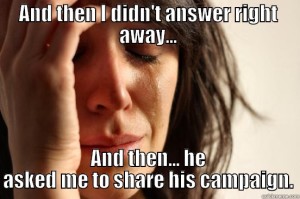
This one is really subtle but it can be a bugger.
Let’s say you’re talking to somebody who is listening intently to your story but they are maintaining a fairly neutral body language and posture so you aren’t sure where they’re at.
You ask them to become a backer of your project.
They pause for a moment.
Perhaps they are trying to find the words to express their admiration that you are taking such a bold risk. Or perhaps they are trying to decide how much to donate. Or perhaps, at precisely the moment you stopped, they just had to swallow and take a breath before they could resume talking.
But you take the slight hesitation as a negative sign and because it’s so unpleasant to be denied, you pipe up: “Or could you just share it with your friends by email or like it on Facebook?”
Mistake made.
This won’t bite you all the time. Some people will have your back.
But some people will decide that instead of being a backer themselves, it would be better for them to share your music crowdfunding project!
But it’s really not better. Check out this excerpt from a post about Social Media and the Bystander Effect:
My friend Brian Solis led a project for the United Nations in 2010 to help increase awareness of Malaria in Africa and also generate $10 donations for bed nets. He found that initially most people shared rather than donated, essentially accomplishing just one of the two goals. In his research to uncover why, he found that people believed that their act of sharing was worth much more than a $10 contribution. He found that people truly thought that their digital influence or social capital equated to tens or even hundreds of individual donations from their connections.
People believe their act of sharing is worth much more than their potential contribution! So they share away and think somebody else will take care of it.
Their intention may be noble but the crappy thing about their thinking is that it’s not true!
Think about it. If everybody just shared but didn’t pledge, well, you’d have a boatload of shares and no pledges!
So the reality is that they are standing there waiting for somebody else to take care of it.
This is very related to what Cialdini wrote about in The Psychology of Persuasion: ask specific people to take specific actions.
20) Not Following Up
A critical part of any sales process is follow-up.
It is so critical that companies spend tens or hundreds of thousands of dollars training their staff and implementing follow-up procedures. Hell, they probably even spend millions on it! (Even if that’s just the cost of the private jet carting around the CEO and Board of Directors ride while they talk about sales follow-up.)
Commonly held wisdom (which means I don’t have a scientific reference but I hear it all the time) is that you need to ask people up to 7 times before they’ll take the desired action. Sarah Peck says so in The Art of Asking and I know I’ve heard it several other places.
Get comfortable with the idea of asking people multiple times.
If they say NO, obviously you need to respect that and stop asking.
But if you contact somebody during the first three days of your campaign and don’t see them take action nor do they say no, then contact them the 2nd week, the 3rd week, and especially in the closing days.
Heck, sometimes people will say yes but not take action because they get distracted and forget. ASK AGAIN!
WHEN YOU ASK DURING A MUSIC CROWDFUNDING CAMPAIGN
There are also a few ways to mess things up by having completely bad timing.
These will all seem obvious but I am constantly surprised at how many people contact us asking for help in the middle of their campaign who are guilty of one of these mistakes.
Usually, these mistakes are made due to lack of planning or misplaced expectations or possibly due to discomfort with asking.
21) Starting too late

Many music crowdfunders are guilty of launching a campaign and then waiting to see what happens.
Perhaps they don’t want to ask, perhaps they think they don’t need to ask or perhaps they think they can make up for it later (they have 30 days, right?).
But he who hesitates is lost.
Or at least HAS lost… a golden opportunity.
There are two periods to capitalize on people’s excitement and momentum. The beginning of the campaign is one of them.
We highly advocate that campaigns plan to roll hot right out of the chute and then do the work to make it happen.
I have seen campaigns hit a $10,000 to $15,000 goal in as little as two days!
Get early support from your closest friends and family to generate momentum and social proof and then capitalize on that by continuing to make your appeal for people to become backers.
Don’t wait until it’s too late. You can still be successful at that point but it will be a lot more difficult and, at the very least, you’ll end up raising less overall.
22) Bad Timing: Not asking when you have momentum
This mistake doesn’t seem as bad as the last one but it has the potential to dramatically lower the amount you raise all the same.
I mentioned seeing campaigns hit a $10,000 to $15,000 goal in as little as two days.
But what happens after that can vary dramatically.
Take a look at this Kickstarter’s funding progress (provided by Kicktraq):
Monster first day! Okay second day. Then coasting…
That may have been okay with them so it’s not a criticism. But I bet they could’ve kept the pedal down and further increased their fundraising if they had wanted to.
Now take a look at Jay Stolar’s Kickstarter (provided by Kicktraq):
Big 1st day! Bigger 2nd day!! Even Bigger 3rd day!!!
And, importantly, check out what happened during the last couple of days of the campaign: another ramp-up. There’s quite a few thousand dollars there folks.
The end of your campaign is the 2nd period when you can capitalize on people’s excitement and momentum.
We worked with Jay so I was in on this campaign. And I will admit that he had done so well, it just didn’t seem possible to raise much more money than the $40,000 he had raised through day 27.
But there were three days left… and you can see what happened: he raised another $10,000! (Same thing happened to Carsie Blanton who, after raising $50,000 through the first 3/4′s of her campaign, pulled in another $10,000 over the last few days.)
If you hit your goal but don’t have a plan for the end of your campaign, you will be leaving money on the table.
23) Giving Up Too Early #2: Giving Up mid-Campaign
Don’t worry about how much of your music crowdfunding campaign has elapsed compared to what percent of your goal you’ve hit.
If you hit the 2/3 mark of your campaign and you’ve only raised 20% of your goal, that doesn’t mean you’ll fail.
So many people make the mistaken assumption that your funding progress should somehow match up with the amount of time that has passed in the campaign.
It’s not true.
I have seen projects make close to 25% or even up to 70% of their total funding in the last few days.
Kickstarter Stats show, “Of the projects that have reached 20% of their funding goal, 81% were successfully funded. Of the projects that have reached 60% of their funding goal, 98% were successfully funded.”
What you need to worry about is being sure that you’ve contacted your friends, family, fans, mailing lists and social media contacts.
Do it as personally as possible (in person, by phone or personal email in that order) especially for those who you have a tight relationship with.
If it helps, think of your campaign as a few mini-campaigns where your JOB is a race to 20%, a race to 50%, a race to 60%…
If you get close to the end and have a long ways to go, it just means that you have a LOT of work to do in a short time…
Also, remember that people are procrastinators in general and that you may have to remind them several times to view your project and pledge before they take action… even if they have meant to all along.
Lesson: believe in yourself and be sure to do the work.
A FEW OTHER MISTAKES
I don’t really know where to put these but they are important so let’s not forget them.
24) Focussing Too Much On Rewards

Whenever you ask somebody for something, it’s nice to have something to offer them. It’s called reciprocity and it just feels better.
So naturally, you want to have great Kickstarter reward ideas for your people.
You need to have good rewards but keep in mind that the vast majority of backers will care more about WHY you are doing your project than about WHAT you are giving them.
In other words, people will back you because they believe in your purpose and mission, not due to the rewards you offer.
So when it comes to your video, project description and talking in person, you must give people the information they need: your Why, Purpose, and Mission.
If you gloss over or skip your Why to get to your rewards so you can “demonstrate value” to them, you’ll be leaving out the most critical information that people need when deciding whether to back a project.
Be sure to put your primary focus on Why and continue to refer back to that throughout your story.
Rewards are necessary and people DO want them, but they very rarely convert backers on their own merits.
25) Not Saying Thank You
When asking for money, you cannot focus on your desire for money in your pocket. You need to have a genuine concern for your relationship with the person you are talking to. That means caring for them as much as for yourself.
If you care genuinely, you will feel compelled to communicate your appreciation and heart-felt gratitude.
If you notice that you’re forgetting or rushing through this step, then you are probably sabotaging your efforts by focussing to much on the outcome and not enough on the relationship.
Take a little time to get grounded. Think about your relationship with the person you’re talking to. Chances are that you are thankful for their presence in your life.
And as a side note, publicly thanking someone on Facebook or Twitter is a good way to make their support of you known publicly and have your project show up in their feed. It won’t help you “hit the jackpot” so to speak, but it will raise awareness and you just never know how those things will turn out.
The Final Word On Asking

In the words of Maya Angelou, “Ask for what you want and be prepared to get it!”
This list gives you a ton of crap to worry about. It takes some preparation and practice to nail it when you ask somebody to pledge to your music crowdfunding project.
But as long as you are very clear on Why you are doing your project and can clearly communicate this to people…
As long as you come to the conversation focussed more on your relationship than on the outcome of the request…
And as long as you ask consistently from the start, through the middle, and to the end of your campaign…
Then you will have the bases covered and the best possible experience when asking people for support.
And remember, you never know who is going to pledge. There will be a few disappointments and there will be many fun surprises. Consider these wise words from Hans York:
With all the folks I had on my list and was sure they would pledge, I was stunned by who really came forward. All in all more folks that I did not expect to pledge did so, and the ones I would have bet my life on did not…
If you’re attached to the outcome you’re doomed. There are so many factors that one impossibly can count in at the beginning. So the best attitude is grateful excitement to launch into an adventure!
If you have yet to launch your music Kickstarter, leave a comment letting us know what freaks you out about your campaign. If you’ve already done one, leave your best pearl of wisdom for those who come after you.
Via CDBaby








